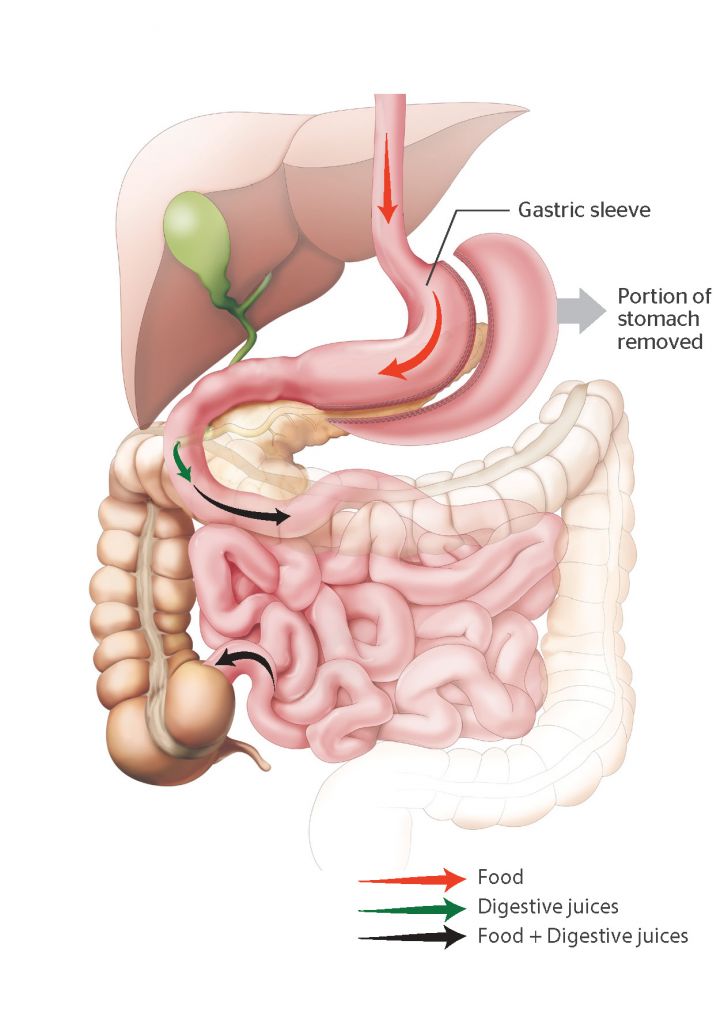Have you struggled with weight loss for years, despite diet and exercise? Gastric sleeve surgery, offered by Southern Weight Loss and Laparoscopy Limited, could be the life-changing solution you’ve been searching for. This minimally invasive procedure can help you achieve significant and sustainable weight loss, improving your health and overall well-being.
The gastric sleeve, or sleeve gastrectomy, is a restrictive procedure that reduces the stomach’s volume and involves no reconfiguration of the intestines.
Sleeve gastrectomy is the most common bariatric surgery procedure performed worldwide. Gastric sleeve surgery also makes patients less hungry because the portion of the removed stomach contains the cells that release the appetite-controlling hormone Ghrelin.
Gastric sleeve surgery can be highly effective for weight loss. 12- 18 months after a Sleeve gastrectomy, weight loss ranges from 60-70% of your excess weight before surgery. So, on average, a typical patient who is 50 kilogrammes overweight will lose 30 kilogrammes.
Currently, the published data suggests that the risk of complications with a gastric sleeve is similar to that of a gastric bypass. The evidence suggests that the long-term weight loss is less than that of the Gastric bypass. After the surgery, your stomach heals for a while so it’s advisable to change your eating habits. You’ll need to eat small meals for your small stomach.
Using keyhole surgery and advanced stapling devices, most of the fundus and body of the stomach are permanently removed and the capacity of your stomach is reduced by approximately 85%. This turns your stomach into a narrow tube, approximately 1cm in diameter, which has a volume of less than 100mls.
Patients stay in the hospital for two nights and will usually return to work within two weeks, however, each patient is different.
- Type 2 Diabetes Mellitus may be cured in up to 80% of patients, within months of surgery.
- High blood pressure is cured in approximately 34% of patients, with a reduction in medication for the remainder.
- 77% of the patients experience resolution or improvement of high cholesterol.
- Obstructive sleep apnoea is controlled in up to 54% of patients.
- Normal gastric emptying is also preserved, because the pylorus is left intact so there is no risk of Dumping Syndrome, often associated with Gastric Bypass surgery.
- Less risk of vitamin deficiencies when compared to gastric bypass surgery.
- It is a non-reversible procedure.
- There is 1-2% risk of leakage staple line where the stomach has been removed. The high pressure in the gastric tube means a leak can be challenging to manage.
- As Gastro-oesophageal reflux can develop after surgery in up to 1 in 5 patients, it is not recommended for patients with pre-existing Gastro-oesophageal reflux disease.
As with any surgical procedure, gastric sleeve surgery carries some risks, including infection, bleeding, and blood clots. Our team takes every precaution to minimize these risks and ensure your safety throughout the surgical process. We will provide you with detailed instructions on how to prepare for surgery and what to expect during your recovery period.
Southern Weight Loss and Laparoscopy Limited provides comprehensive support throughout your weight loss journey. Before surgery, you’ll undergo a thorough evaluation, including medical history review, physical examination, and psychological assessment. This helps ensure you’re a good candidate for the surgery and prepares you for the post-surgical process. You may be required to follow a specific diet plan and make lifestyle adjustments before surgery.
Keep in mind, that after losing weight, it’s possible to regain some of the weight that you lose. To avoid this, make sure to follow a healthy diet and get regular exercise.
To find out more call us on
03 464 0970
FAQs
Who is a candidate for gastric sleeve surgery?
Gastric sleeve surgery is typically considered for people with a body mass index (BMI) of 35 or higher, or those with a BMI of 30 or higher who have a weight-related health condition, such as type 2 diabetes or sleep apnea.
What are the benefits of gastric sleeve surgery?
Gastric sleeve surgery can lead to significant weight loss and improve weight-related health conditions. It can also be a less complex surgery compared to other bariatric procedures.
What is the recovery like after gastric sleeve surgery?
Most people go home the day after surgery and return to work or other daily routines within a week or two. You will need to follow a special diet that starts with clear liquids and gradually progresses to soft foods and then regular foods.
Are there any long-term side effects of gastric sleeve surgery?
Some people may experience long-term side effects such as heartburn, vitamin deficiencies, and difficulty absorbing certain nutrients. Regular follow-up with your doctor and taking prescribed supplements can help minimize these risks.


